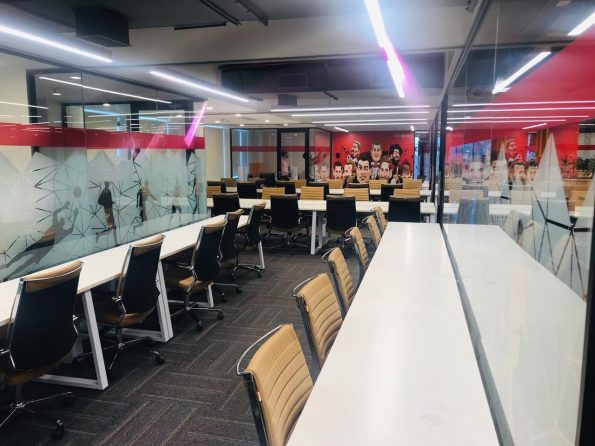Human Resources is an essential part of any organization, and the importance manifolds, in the case of a global HR professional. Navigating cultural differences as a global HR professional requires a combination of sensitivity, awareness, and effective communication skills. Continue reading to understand an in-depth guide on how to navigate these cultural differences as a global HR professional.
💡 Are you looking for Coworking space in Gurgaon, Noida or Delhi? We are just a call away.
Call Now: 08999 828282
10 Best strategies for navigating cultural differences As a Global HR Professional
- Educate Yourself
- Give Respect and Empathy
- Effective Communication
- Cultural Sensitivity Training
- Adapt HR Policies
- Cross-Cultural Team Building
- Seek Feedback
- Lead by Example
- Stay Informed
- Collaborate with Local Experts

1. Educate Yourself
Start by educating yourself about the cultures of the regions where your company operates. Understand cultural norms, values, communication styles, and business practices. This will help you anticipate potential issues and adapt your HR strategies accordingly.
2. Give Respect and Empathy
Show respect and empathy towards employees from different cultural backgrounds. Acknowledge and appreciate cultural differences rather than judging them. This will help build trust and rapport with employees from diverse backgrounds.
3. Effective Communication
Be mindful of language barriers and communication styles. Use simple and clear language, and avoid idioms or slang that may not translate well across cultures. Encourage open and transparent communication, and be willing to listen actively to understand different perspectives.
4. Cultural Sensitivity Training
Provide cultural sensitivity training to employees, especially those in managerial positions. Help them understand how cultural differences can impact workplace dynamics and how to effectively manage diverse teams.
5. Adapt HR Policies
Adapt HR policies and practices to accommodate cultural differences while still maintaining alignment with the company’s values and objectives. For example, consider flexible work arrangements to accommodate religious holidays or cultural celebrations.
💡 SMBs looking for HR, Marketing, Technology and Funding solutions for their business.
Call Hello Jarvis 994 8000 800
6. Cross-Cultural Team Building
Encourage cross-cultural team building activities to foster understanding and collaboration among employees from different backgrounds. This could include cultural exchange events, team-building exercises, or diversity training workshops.
7. Seek Feedback
Regularly seek feedback from employees about their experiences with HR policies and practices. Use this feedback to identify areas for improvement and make necessary adjustments to better accommodate cultural differences.
Also Read: Role of HR in Mental Health and Well-being at Work
8. Lead by Example
As an HR professional, lead by example by demonstrating cultural sensitivity and inclusivity in your own behavior and interactions. This will set a positive tone for the rest of the organization to follow.
9. Stay Informed
Stay informed about global trends and developments in HR practices related to diversity, equity, and inclusion. Continuously update your knowledge and skills to effectively navigate cultural differences in the workplace.
10. Collaborate with Local Experts
Collaborate with local experts or consultants who have a deep understanding of the cultural nuances in specific regions. Their insights can be invaluable in tailoring HR strategies to the local context.
To conclude, we hope you learned the best strategies through which global HR professionals can effectively navigate cultural differences in the workplace and create a more inclusive and harmonious work environment.
Setting up your office at The Office Pass (TOP) co-working spaces available in Delhi and NCR can help you further in navigating the cultural differences as a global HR professional. TOP offers all the latest state-of-the-art facilities all under one roof at cost-effective pricing. Contact us for more details at 08999 828282.
FREQUENTLY ASKED QUESTIONS (FAQS):
Question: How can global HR professionals navigate cultural differences effectively?
Answer: Global HR professionals can navigate cultural differences effectively by first educating themselves about the cultures they will be working with. This includes understanding cultural norms, values, communication styles, and business etiquette.
Question: Why is it important for HR professionals to be culturally sensitive?
Answer: Cultural sensitivity is crucial for HR professionals because it helps them build trust and rapport with employees from diverse backgrounds. It also ensures that HR practices and policies are inclusive and respectful of different cultural perspectives.
Question: What strategies can HR professionals use to address cultural differences in the workplace?
Answer: HR professionals can implement strategies such as cross-cultural training programs, mentorship initiatives, and creating a culturally inclusive work environment. They can also encourage open communication and provide resources for employees to learn about different cultures.
Question: How can HR professionals promote diversity and inclusion in multinational companies?
Answer: HR professionals can promote diversity and inclusion by implementing policies that value and celebrate diversity, ensuring diverse representation in recruitment and leadership positions, and fostering a culture of inclusion where all employees feel valued and respected.
Question: What challenges might HR professionals face when working with employees from different cultural backgrounds?
Answer: Some challenges HR professionals might face include language barriers, miscommunication due to cultural differences, differing expectations regarding work practices and norms, and navigating conflicting cultural values or beliefs.
Question: How can HR professionals overcome language barriers in a multicultural workplace?
Answer: HR professionals can overcome language barriers by providing language training programs, using interpreters or translation services when necessary, and encouraging the use of common languages such as English as a lingua franca for communication.
Question: How can HR professionals foster cultural competence among employees?
Answer: HR professionals can foster cultural competence among employees by organizing cultural awareness workshops, promoting cross-cultural collaboration and teamwork, and providing opportunities for employees to engage with different cultures both within and outside the workplace.
Question: What role does empathy play in navigating cultural differences as an HR professional?
Answer: Empathy is essential for HR professionals when navigating cultural differences as it allows them to understand and appreciate the perspectives and experiences of employees from diverse backgrounds. It enables HR professionals to build trust and create a supportive work environment for all employees.
Question: How can HR professionals address conflicts arising from cultural differences in the workplace?
Answer: HR professionals can address conflicts arising from cultural differences by facilitating open and respectful communication between parties. Besides, they can provide mediation or conflict resolution services, and promote a culture of understanding and empathy.
Question: What resources are available for HR professionals to learn more about navigating cultural differences?
Answer: HR professionals can access resources such as cultural competency training programs, online courses, books, and articles on cross-cultural communication and management.



